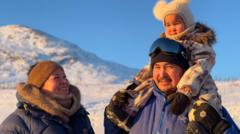The tranquil landscapes of Greenland, marked by majestic ice-covered mountains and serene waters, are not immune to the turbulence of international politics. With Donald Trump on the cusp of his presidency, his provocative remarks about possibly acquiring Greenland, or even taking it by force, have ignited discussions across the island. Many locals, however, strongly reject the notion that their home is up for grabs.
In remote settlements, sentiments resonate with clarity, as expressed by a boat skipper who sarcastically extended an invitation to Trump, saying, "He’s welcome to come visit for sure... Greenland belongs to Greenlanders. So, Trump can visit but that's it." This dual acknowledgment of visitors and sovereignty encapsulates the ambivalence many feel about outside interference.
As the icy winds whip through the picturesque settlement of Kapisillit, elders like Kaaleeraq Ringsted, 73, voice their frustration over the idea of sale or invasion. "It is not acceptable that he says this. Greenland is not for sale," he emphatically states, reflecting a broader desire to maintain traditional ways of life for future generations. The economy faced by residents is intertwined with cultural heritage, as they continue enduring a climate where fishing and hunting remain vital.
Further south in Nuuk, the capital and the world's northernmost city, the arrival of Donald Trump Jr. only intensified local sentiments. Despite a brief visit where he interacted with residents, opinions sway widely. Angutimmarik Hansen, a local farmer, labels Trump’s rhetoric as "stupid" and doubles down on the island’s determination not to sell. He asserts, "Never will we sell Greenland."
However, the Trump presidency has simultaneously injected urgency into discussions of independence for Greenland from Denmark. Kuno Fencker, a parliamentary member from the governing coalition, argues for negotiating directly with the U.S. as an equal, asserting that Greenland must chart its own course free from colonial legacies.
While there’s a consensus on aspiring for independence, pragmatic concerns linger. Greenland depends significantly on financial support from Denmark, which constitutes approximately 20% of its GDP. Fencker suggests a future negotiation with both Denmark and the U.S. to secure that necessary backing, acknowledging the dual pressures of securing sovereignty while maintaining economic viability.
The prime ministers of Denmark and Greenland addressed the escalating discourse initiated by Trump, navigating the complexities of national identities. Mute Egede, Greenland's Prime Minister, poignantly said, "We do not want to be Danish, we do not want to be American, we want to be Greenlandic." This statement embodies the aspiration of many Greenlanders to forge an identity distinct from former colonial ties.
The conversation around independence cannot overlook the scars of the past, particularly the historical injustices experienced by the Inuit population. As discussions unfold, calls for recognition of past grievances resurface, suggesting the need for a healing process intertwined with any future independence trajectory.
Amidst the backdrop of political rhetoric, one prevailing message from the icy fjords to the capital is that Greenlanders are resolute in their resolve. The personal experiences shared across communities underscore a collective desire: Greenland's destiny remains firmly in the hands of its people, undeterred by powerful threats.
In remote settlements, sentiments resonate with clarity, as expressed by a boat skipper who sarcastically extended an invitation to Trump, saying, "He’s welcome to come visit for sure... Greenland belongs to Greenlanders. So, Trump can visit but that's it." This dual acknowledgment of visitors and sovereignty encapsulates the ambivalence many feel about outside interference.
As the icy winds whip through the picturesque settlement of Kapisillit, elders like Kaaleeraq Ringsted, 73, voice their frustration over the idea of sale or invasion. "It is not acceptable that he says this. Greenland is not for sale," he emphatically states, reflecting a broader desire to maintain traditional ways of life for future generations. The economy faced by residents is intertwined with cultural heritage, as they continue enduring a climate where fishing and hunting remain vital.
Further south in Nuuk, the capital and the world's northernmost city, the arrival of Donald Trump Jr. only intensified local sentiments. Despite a brief visit where he interacted with residents, opinions sway widely. Angutimmarik Hansen, a local farmer, labels Trump’s rhetoric as "stupid" and doubles down on the island’s determination not to sell. He asserts, "Never will we sell Greenland."
However, the Trump presidency has simultaneously injected urgency into discussions of independence for Greenland from Denmark. Kuno Fencker, a parliamentary member from the governing coalition, argues for negotiating directly with the U.S. as an equal, asserting that Greenland must chart its own course free from colonial legacies.
While there’s a consensus on aspiring for independence, pragmatic concerns linger. Greenland depends significantly on financial support from Denmark, which constitutes approximately 20% of its GDP. Fencker suggests a future negotiation with both Denmark and the U.S. to secure that necessary backing, acknowledging the dual pressures of securing sovereignty while maintaining economic viability.
The prime ministers of Denmark and Greenland addressed the escalating discourse initiated by Trump, navigating the complexities of national identities. Mute Egede, Greenland's Prime Minister, poignantly said, "We do not want to be Danish, we do not want to be American, we want to be Greenlandic." This statement embodies the aspiration of many Greenlanders to forge an identity distinct from former colonial ties.
The conversation around independence cannot overlook the scars of the past, particularly the historical injustices experienced by the Inuit population. As discussions unfold, calls for recognition of past grievances resurface, suggesting the need for a healing process intertwined with any future independence trajectory.
Amidst the backdrop of political rhetoric, one prevailing message from the icy fjords to the capital is that Greenlanders are resolute in their resolve. The personal experiences shared across communities underscore a collective desire: Greenland's destiny remains firmly in the hands of its people, undeterred by powerful threats.




















